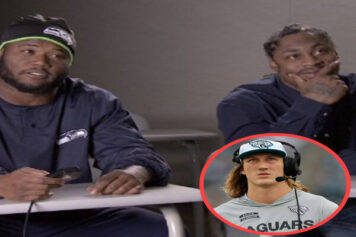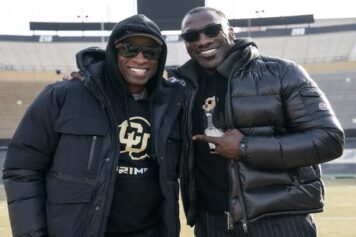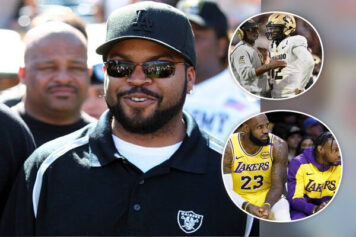The Shadow League often highlights women of color who are groundbreakers and culture enhancers in the world of sports. Black girl magic has been taking over the sports landscape in recent years and while we celebrate the new accomplishments of young athletes of color who are changing the game and venturing into stratospheres that once excluded them from participation, we also have to remember the pioneers with significant accomplishments that may have lacked the social media push that exists now.
Peggy Llewellyn, of Mexican and Jamaican descent, is a pro stock motorcyclist on the NHRA circuit and the first woman of color in the world to win a professional motorsports event, winning at the NHRA POWERade Dallas event in 2007, earning her an appearance in the inaugural Countdown to 4 and Countdown to 1, giving her a finish in the POWERade top five in standings where she recorded her post-career-best time and speed.
History In Nhra on Twitter
In 2007 Popular Pro Stock Bike Rider @PeggyLlewellyn Picked A Very Popular Win In Pro Stock Bike @txmplex Which Was Her First #InNhra
For the season, she finished fourth overall and holding the highest placing for a female in the Pro Stock Motorcycle class. The following season she ran an abbreviated 2008 where she advanced to the semifinals in Denver, finishing the season qualifying in five of six races.
Shes also the first woman of color to own, operate, and race for a professional motorsports team. Her success reflects the progressive nature of NHRA racing that dates back to the 1970s.
“Unlike NASCAR, Formula 1, or INDYCAR racings other primary seat-fillers NHRA drag racing for much of the past 40 years has been an oasis of female athletic achievement in the untrodden terrain of co-ed sports. Since Automotive Hall-of-Famer Shirley Muldowneys 1977 NHRA world points championship win, the sport has seen an unbroken wave of championship-caliber female drivers: Lori Johns and Shelly Anderson in the 90s; Karen Stoffer and Melanie Troxel in the 2000s.”
I took a few minutes to speak to the racing pioneer, who still has hopes of returning to competition in the next two years once she can secure financing.
The Shadow League: How’d you get into racing?
Peggy Llewellyn: Growing up in San Antonio, Texas, my father owns a motorcycle shop, so that’s where the love of motorcycles came for me. He actually started out racing cars but they became too expensive and he went to bikes. So I didn’t have dolls and dollhouses in my house… I had motorcycles. So while all of the kids were playing games in the neighborhood, I was up and down the block and on the sidewalks on my motorcycle just living life and having fun, along with my brother.
I took to riding quickly. It’s something that we have always been around and that’s how our family outings were spent — at the race track. It was the culture of my upbringing to ride motorcycles.
Peggy Llewellyn Karen Stoffer Make the Show US Nationals 2008
Peggy Llewellyn Karen Stoffer Make the Show US Nationals 2008
TSL: When did you start competing?
PL: Competing? It would have to been like 1996 or ’97 because I got out of racing for a while and then started pit crewing for my brother who was racing locally in different tournaments and circuits they had, but while helping him I got bit by the racing bug again and told my Dad that I wanted to get back into it.
At first, he didn’t take me seriously and he had me build my own motorcycle before I could start competing not only locally in San Antonio also in a series they had at the time called The Texas Shootout. I started competing in that event and it was raced in Houston.
In 2001, Llewellyn raced six pro events. Without the sponsorship finance to continue, she left the sport and trained as a Real estate agent. It took five years to secure another sponsor and get back onto the circuit.
TSL: Your Dad made you prove to him that you wanted to race professionally by immersing you in the business side and having you launch your own racing team, Two-Wheel Women Racing.
PL: Yes… I am also the only woman of color to own my own racing team. It all started back in 1997 when I was building my bracket bike that I raced locally and wanted to do it full-time for a living. That company was really my Dad making me understand the competition side and business side of drag racing, how the funding works and contracts. I basically had to build my own business in addition to racing.
TSL: When did you realize you had special talents?
PL: When I was racing bracket bikes, there were no women in the NHRA. Back in 96 three women came out and attempted to qualify for the circuit and two out those three women made it. After seeing that I told my dad I wanted to race professionally.
Peggy Llewellyn 2007
Peggy Llewellyn 2007
Before that…I wouldn’t say that I didn’t think I had the talents, but when you actually see an example of a woman doing it and you see you can make money doing it then a light switch went on in my head and that was the first part in making it into the NHRA.
TSL: How does it feel to be the first black woman on the NHRA circuit, first to win a motorsport event and the ninth women in history to do it?
PL: Oh my Gosh… now 10 years after the fact, I’m starting to realize the magnitude of it because at first I just wanted to race professionally and when I got the opportunity I was focused on qualifying and not the significance of being a woman of color. I understood it back then, but I just wanted to race. Now, however, a decade later it’s like, Oh, thats what happened Now I’m starting to understand and realize the wins historical significance.
Peggy Llewellyn on Twitter
When co-workers play the video of your #NHRA win in 2007 @txmplex #peggyllewellyn #firstin2007 #history @RushRacingProd https://t.co/xj2qqS3nkv
TSL: What’s it like being a part of Black History?
PL: Now it’s more of you know, I don’t want to be the only one. I did open doors, but I want to see other women and men of color win to where it’s not like they keep mentioning that I was the first, but there are others who did it too.
I have fans who come up to me and say I finally found someone in the sport who looks like me and gives me the encouragement that I can do that too.
Yes, there are women of all colors who race motorcycles and it needs to become less of a surprise.
Peggy Llewellyn Interview | 100 Wins by Women
As part of the 100 Pro Wins by Women in the NHRA series, check out this exclusive interview with Pro Stock Motorcycle rider Peggy Llewellyn. Peggy is one of 14 women that have contributed to this motorsports milestone. #100WinsbyWomen
TSL: Are you retired?
PL: Ooooh, Noooo. Don’t use the word… I’m not retired. I still have it in me to do it…just trying to find the funding has always been the drawback and it’s something that I hope to work and change that for other motorcyclists as well. Make it less hard for other competitors to be able to race motorcycles because they don’t have the funding. At least get different companies interested that are outside of motorsports who can get involved and sponsor drivers, particularly in Pro Stock Motorcycles. I’m working with companies trying to put something together if not for 2018-2019.
TSL: With more time on your hands these days, what TV Shows are you watching?
PL: Being Mary Jane is coming back on. I love Greys Anatomy, Black-ish, Scandal just went off and dont laugh, I love The Golden Girls, always have.
TSL: Its been 11 years since your historic win. Are you happy with the progress in terms of diversity in motorsports since your victory in 2007?
PL: I think I see motorsports progressing in that they are focusing on the women. What I’d like to see is more women of color to get the spotlight and notoriety and training and funding and not necessarily for competing, but maybe they want to be an owner or a crew chief or build a motorcycle or work on the horsepower, but I do see it progressing some.



